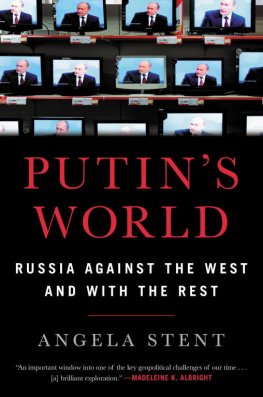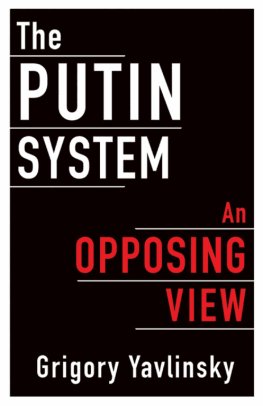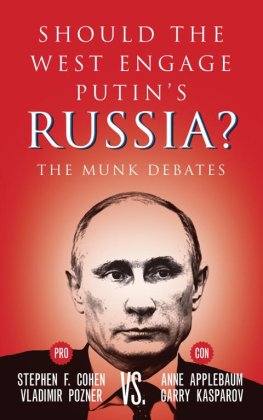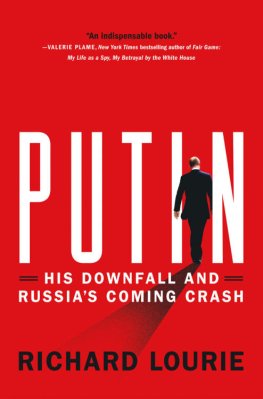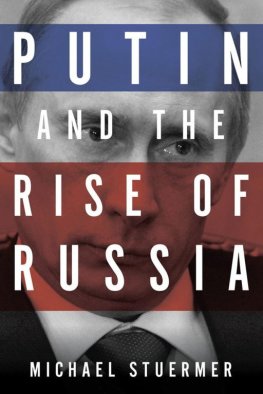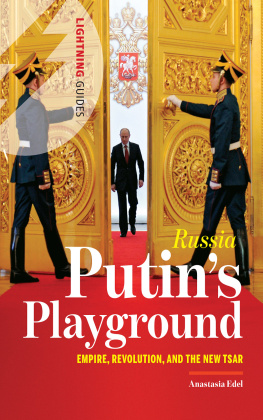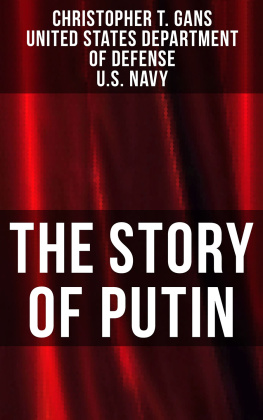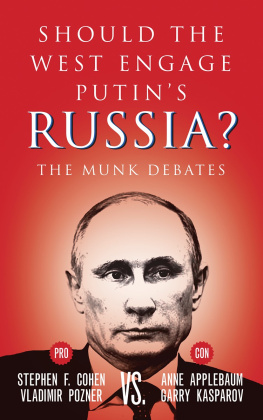Angela E. Stent
PUTINS WORLD
RUSSIA AGAINST THE WEST AND WITH THE REST
To Danny, Alex, Rebecca, and Jessica.

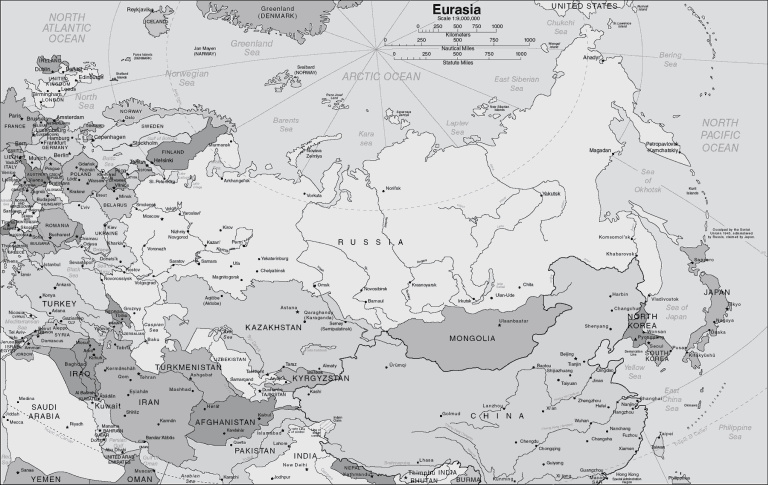
In July 2018, Russia showed its best face to the world as it hosted the World Cup. The spirited opening ceremony featured bears, dragons, and picturesque onion domes. The Russian teamranked at the bottom of all those competingdefeated Saudi Arabia in the first game and went on all the way to the quarterfinals, when Croatia defeated it. But even that loss did not diminish the pervasiveand unexpectedatmosphere of good feeling. For a month, Russia welcomed fans from around the world with enthusiasm and camaraderie. Russians and foreign fans partied all night in cities from Kaliningrad in the west to Ekaterinburg, 1,500 miles away in Siberia. Even the normally dour Russian policemen had only smiles for those celebrating. As Russian president Vladimir Putin put it, People have seen that Russia is a hospitable country, a friendly one for those who come here. He added, Im sure that an overwhelming majority of people who came will leave with the best feelings and memories of our country and will come again many times.1
The World Cup represented a major success for President Putin. Before the games opened, there were questions about whether Russia would be able to build the facilities in time for the games, about corruption involved in the bidding for the construction, and about how international visitors would be received. Moreover, the games were held in a politically charged atmosphere, when Russias relations with the West were the worst they had been since post-communist Russia emerged in 1992. Russias annexation of Crimea and launch of a war in Southeastern Ukraine, its cyber interference in the US and European elections, its support for Bashar al-Assad in the brutal Syrian Civil War, and its domestic crackdowns on opponents of the regimeand the US and EU responsesall this had intensified the already adversarial relationship between Putins Russia and the West.
The World Cup left foreign fans with positive views of their hosts. Many had arrived in Russia with stereotypes about unfriendly Russians living in a backward country. But they reported being surprised by how normal Russia and its people seemed. The US sent the largest number of spectators, even though the American team did not qualify to compete. Western journalists emphasized that it was important to differentiate between the Russian government, which they criticized, and its people, who were hospitable. For their part, the Russians seemed surprised by how approachable the foreign fans were. Russians were used to seeing westerners constantly vilified in their state-run media, but a poll conducted after the games ended showed that Russians view of Americans and Europeans had significantly improved.2 The games left an afterglow of positive feelings, even though the Russians realized that, once the foreigners departed, they would no longer be able to celebrate all night in the streets. The Russia team may have lost, but the World Cup was clearly a victory for Vladimir Putin.
The World Cup represented a culmination of Putins project, which had been nearly two decades in the making: the return of Russia to the world stage as a great power to be respected, feared, andas the World Cup showedliked and even admired. Russias reemergence as a major player capable of projecting power well beyond its immediate neighborhood was unexpected and quite remarkable, given its limited economic resources: a GDP smaller than Italys, demographic decline, decaying infrastructure, and the negative impact of successive waves of Western sanctions in response to its actions. A few years before, President Obama had described Russia as a regional power.3 But Putin proved otherwise. Russias reach is now clearly global.
This is the new Russian reality that has developed since Putin entered the Kremlin in 2000. At that point Russia was emerging from a decade of political chaos and an economic meltdown. Some went as far as to opine, Russia is finished.4 When an ailing Boris Yeltsin handed over the reins of power to a virtually unknown former KGB case officer, it was unclear how the fledgling post-communist Russia could move forward. In retrospect, it is clear that Putin was from the start determined not only to restore firm state control over the Russian polity but also to resurrect Russia as a great power. Remarkably, he has been able to accomplish both of these goals, despite Russias economic and military constraints.
It is important to understand how and why Russia has returned to the world stage. It is now active in areas from which it withdrew after the USSR collapsed, and its reappearance has affected the ability of the United States and its allies to conduct their own foreign policy effectively. The new reality of Putins world necessitates a rethinking of how to deal with Russia going forward.
Putins world is one in which relations with the United States and much of Europe are adversarial. It is also a world in which Russia has a deepening partnership with China, an increasingly influential role in the Middle East, and has returned to areas of the world from which Russia was forced to withdraw after the Soviet collapse. Moreover, Russias seat and veto on the United Nations Security Council have enabled Moscow to exercise influence well beyond what its current capabilities would suggest. Russias ability to thwart Western interests has also enabled it to advance its own interests internationally. Western attempts to isolate Russia after the seizure of Crimea have failed. Moreover, the increasing disarray in the transatlantic alliance since Donald Trump came to power, plus Brexit (Britains decision to leave the European Union) and a European Union beset by new challenges, all these have provided Putin with unanticipated opportunities to advance Russias interests, which he has skillfully utilized.
This book explains how Putins Russia has managed to return as a global player and what that new role means. It examines why Moscows relations with the US and muchalthough not allof Europe have deteriorated, and why so many other countries have a positive view of Russia and are working with Moscow productively in a variety of fora. The book also traces the origins and development of the Russian national idea that has been consolidated in the nearly two decades Putin has been in power and that drives policy today, highlighting how important it is to understand how and why Russia has reemerged and how best to approach Moscow in this turbulent new global reality.
It is customary to describe Russians as talented chess players with a grand strategy, but Putins sport is judoand that has given him a unique perspective on dealing with competitors and adversaries. Growing up poor in postwar Leningrad, martial arts transformed his life because it was a way of defending himself against larger, tougher boys who tried to beat him up. It was a tool to assert myself in the pack. The Leningrad evening paper in May 1976 introduced the 24-year-old master judoist to the city as not well known so far amongst specialists or fans but predicted that that would soon change.5 In judo, a seemingly weaker practitioner can rely on inner strength and force of will to defeat a larger, more aggressive foe. Putting an opponent off-balance and taking advantage of their temporary disorientation to strike a winning blow is a basic technique. Putin has proven to be adept at seizing opportunities presented to him by the disarray in the West and the indecisiveness of some of its leaders.

